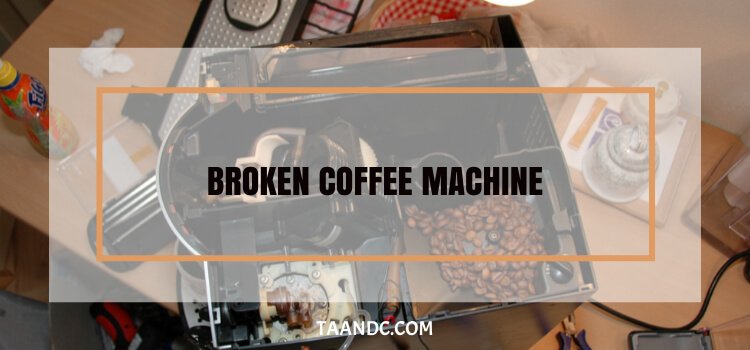The frustration of a broken coffee machine—been there, done that. From sudden malfunctions to unexpected leaks, I've faced it all. But fear not! Over time, I've learned a thing or two about troubleshooting. First off, don't panic. Take a deep breath and assess the situation calmly. Sometimes, it's a simple fix like unclogging or replacing a part. Other times, it might need professional attention. Remember, patience is key. And if all else fails, treat yourself to a backup brew method while you get it sorted. You'll be back to your morning ritual in no time!

Identifying the Signs of Trouble
Identifying the signs of trouble is critical in both personal and professional aspects of life. Recognizing subtle shifts in a relationship, pinpointing early indicators of a project going off track, or discerning the first symptoms of an impending crisis, being vigilant and perceptive is vital. These signs can manifest in various forms, such as a change in behavior, declining performance, or a gut feeling that something isn't quite right. By honing our ability to detect these warning signals, we empower ourselves to take proactive measures and make informed decisions, ultimately steering our lives and endeavors toward more positive outcomes.
Crucial Clues: Recognizing a Broken Coffee Machine
When you're a devoted coffee lover, your morning brew is sacred. But what if your trusty coffee machine suddenly betrays you? Identifying the signs of trouble is the first step to solving the Java crisis. Here are some telltale indicators that your beloved coffee machine might be on the fritz:
- Strange Noises: If your coffee maker starts producing clunks, bangs, or hisses that it never did before, it's time to investigate.
- Leaks and Drips: Coffee puddles where they shouldn't be? Leaks or drips from your machine can be a red flag.
- Failure to Brew: The most obvious sign – no coffee! If your machine isn't brewing as it should, something's amiss.
- Inconsistent Temperature: Is coffee not hot enough or is it scalding? Temperature irregularities can signal trouble.
- Excess Sediment: If you find more coffee grounds in your cup than usual, your machine's filter system may fail.
Identifying these signs early can save your coffee-loving mornings. Keep an eye out and stay tuned for solutions in the following sections.
Read More: Breville The Bambino Vs Duo Temp Pro: Espresso Excellence
Unveiling The Culprit: Diagnosing Broken Coffee Machine
o, your beloved coffee machine isn't brewing that perfect cup anymore, and you've noticed some concerning signs. Before rushing to the repair shop or online tutorials, accurately diagnosing the issue is crucial. Taking the time to understand the problem can save you time and money. Here's a step-by-step guide to uncover the culprit behind your broken coffee machine:
- Start with a Visual Inspection: Examine your coffee machine closely, looking for visible issues like loose parts, visible damage, or unusual residue.
- Check the Water Reservoir: Ensure the water reservoir is seated correctly and has no cracks or leaks. More water supply can lead to brewing problems.
- Inspect the Filter: A clogged or damaged filter can hinder proper water flow, affecting brewing. Remove, clean, or replace the filter as needed.
- Examine the Heating Element: The heating element is essential for brewing. It may need cleaning or replacement if it's visibly damaged or covered in scale.
- Consult the User Manual: The user manual can be valuable if you need clarification on any aspect of your coffee machine's functionality or maintenance. It may contain troubleshooting tips specific to your model.
By following these steps, you'll be well on your way to diagnosing the issue with your coffee machine. In the following sections, we'll delve into DIY fixes and knowing when to seek professional help.
Solutions at Fingertips: DIY Fixes
Facing a malfunctioning coffee machine can be daunting, but many common issues have straightforward DIY solutions. By rolling up your sleeves and taking a few simple steps, you can get your coffee maker back in action without needing professional help. Let's explore some of the most frequent problems and how to tackle them:
1. Clogged Water Tubes
- Disconnect your machine from the power source.
- Remove the water reservoir and the filter.
- Use a small brush or a paper clip to clear any clogs in the water tubes.
- Reassemble the components and try brewing again.
2. Scale Buildup
- Mix equal parts water and vinegar in the water reservoir.
- Run a brewing cycle without coffee grounds.
- Repeat this process with clean water to eliminate vinegar residue.
3. Coffee Grounds in Cup
- Ensure you're using the correct coffee grind size for your machine.
- Examine the filter basket for damage or holes.
- If needed, replace the filter basket or adjust your coffee grind.
4. Leaks & Drips
Check for loose or damaged parts, such as the drip tray or water reservoir. Tighten or replace any faulty components to prevent leaks.
5. Weak Brew
Ensure you're using the correct coffee-to-water ratio. Clean your coffee machine thoroughly to remove any coffee oils or residue affecting the taste.
Unplug your coffee machine before attempting any repairs, and consult your user manual for model-specific guidance. These DIY fixes can often breathe new life into your broken coffee machine and have you sipping your favorite Brew again in no time.
Read More: Brim Replacement Carafe: Elevating Your Coffee Ritual
Calling the Experts: Professional Repair
While DIY fixes can work wonders for many coffee machine issues, there are times when you should leave it to the professionals. Understanding when to seek expert help can prevent further damage and ensure the longevity of your beloved coffee maker. Here's a breakdown of situations where DIY fixes might not suffice:
1. Electrical Problems
If you notice electrical issues such as flickering lights or unusual sounds from the machine, stop using it immediately. Attempting to fix electrical problems yourself can be hazardous. Call a professional electrician or appliance repair technician.
2. Major Leaks
If your coffee machine is leaking water significantly, it could be a sign of a serious internal issue. Continuing to use it might cause more damage. Contact a professional technician to assess and repair the problem.
3. Complex Mechanical Failures
DIY repairs become challenging when intricate parts like the pump or control board malfunction. These components require specialized knowledge and tools. It's best to consult a professional. When searching for a reputable appliance repair service, consider these tips:
- Seek recommendations from friends, family, or online reviews.
- Ensure the technicians are certified and experienced with coffee machine repairs.
- Request an estimate before agreeing to any service to avoid unexpected costs.
By recognizing the limitations of DIY fixes and knowing when to call in the experts, you can extend the life of your coffee machine and enjoy your daily brew worry-free.
Read More: Philips 1200 Vs Philips 3200: A Taste Off Adventure
Surviving the Coffee Machine Breakdown Blues
When your trusty coffee machine is temporarily out of commission, your morning routine may need a reboot. Fear not, because there are plenty of ways to satisfy your caffeine cravings and navigate this coffee-less stretch. Here's a guide to help you cope without your coffee machine:
1. Instant Coffee
- Keep some instant coffee on hand for quick and easy caffeine fixes.
- While it may not match the quality of your machine, it'll do in a pinch.
2. Visit Coffee Shops
- Treat yourself to a daily coffee run at your favorite local cafe.
- Enjoy the variety and social aspect while your machine gets repaired.
3. French Press or Pour-Over
- Embrace manual brewing methods like French press or pour-over.
- They require minimal equipment and can produce a satisfying cup.
4. Cold Brew
- Make a batch of cold Brew in advance for a refreshing alternative.
- It's a great option, especially in warmer months.
5. Explore Tea Options
- Expand your palate with different tea varieties.
- Tea can provide a comforting alternative to your usual Coffee.
6. Adjust Your Routine
Allocate extra time in the morning for coffee preparation alternatives. Use this period as a moment of mindfulness to kickstart your day.
Remember, your coffee machine's downtime can allow you to explore new flavors and brewing techniques. Adapt, enjoy, and savor the unique experiences each method offers. Your morning ritual will be back on track in no time.
FAQ
What are the common signs of a broken coffee machine?
Common signs include strange noises during brewing, leaks or drips, failure to brew, inconsistent temperature, and excess coffee grounds in your cup.
Can I fix a broken coffee machine myself?
It depends on the issue. Some common problems like clogs or scale buildup can often be resolved with DIY solutions. However, for electrical or complex mechanical problems, it’s best to consult a professional.
How can I prevent my coffee machine from breaking down in the future?
Regular maintenance is critical. Clean your machine regularly, describe it as needed, and follow the manufacturer’s recommendations in the user manual. This can extend its lifespan.
When should I consider seeking professional help for my coffee machine?
You should contact a professional if you notice electrical issues, major leaks, or complex mechanical failures. Additionally, if DIY fixes aren’t resolving the problem, it’s time to call in an expert.
Is repairing an old coffee machine worth it, or should I invest in a new one?
The decision depends on the extent of the damage and the age of your coffee machine. If the repair cost is significant and your machine is quite old, investing in a new one might be more cost-effective. Consider the long-term benefits and features of a new machine as well.
Conclusion
A broken coffee machine can disrupt your daily routine. Still, the challenge can be navigated with the proper knowledge and approach. Recognizing the common signs of trouble and diagnosing the issue correctly are essential first steps. DIY fixes can often address minor issues, but knowing when to seek professional help is equally crucial, especially for electrical or complex mechanical problems. Preventative maintenance and regular cleaning can help extend your coffee machine's lifespan, and when it's time to part ways with an old, irreparable machine, consider investing in a new one with updated features and benefits. Ultimately, with some resourcefulness and a willingness to adapt, you can continue to enjoy your morning brew even in the face of a broken coffee machine.


